South Africa is set to conduct municipal by-elections on 19th July 2023, across five provinces – Eastern Cape, Free State, KwaZulu-Natal, North West, and Western Cape. There are six independent candidates and 55 candidates from 16 political parties vying for the available positions. This article provides a breakdown of the contests in each province.
Eastern Cape: Senqu Municipality
Ward 05 in the Senqu Municipality (EC142) in the Eastern Cape will witness a contest between Ntombovuyo Monica Sebatana of the African National Congress (ANC) and Ncediwe Sinxadi from the Economic Freedom Fighters (EFF). The ANC represented this ward earlier before it became vacant due to the incumbent councillor’s death. In the 2021 Municipal Elections, the ward had a voter turnout of 47.09%.
Free State: Mangaung Municipality
Wards 07, 29, 49, and 50 in Mangaung Municipality (MAN) in the Free State province will be holding by-elections. These wards were previously represented by the ANC, but the positions became vacant when the councillors’ memberships were terminated.
Ward 07 will have an independent candidate, Chabeli Frank Rampai, and five other candidates from different parties competing. In 2021, this ward had a voter turnout of 37.82%.
Ward 29 will see two independent candidates, Lesawana Paulus Mothekhe and Mpho Isaac Mokoakoa, competing against four party candidates. The 2021 Municipal Elections recorded a voter turnout of 39.10%.
Ward 49 will have an independent candidate, Lehlohonolo Joseph Moqolo, competing against eight party candidates. The previous voter turnout for this ward was 37.93%.
Lastly, in Ward 50, independent candidate Makoa Cristophel Lelala will compete against five party candidates. In 2021, this ward had a voter turnout of 45.06%.
KwaZulu-Natal: Mthonjaneni and Nkandla Municipalities
Mthonjaneni Municipality (KZN285) in KwaZulu-Natal will witness a contest in Ward 06 between independent candidate Miniyokulinda Sphamandla and three party candidates. The ward was previously represented by the ANC, and the vacancy arose following the councillor’s resignation. In 2021, the voter turnout in this ward was 54.45%.
In Nkandla Municipality (KZN286), three candidates will contest for Ward 02. This ward was previously represented by the Inkatha Freedom Party (IFP), and the vacancy arose following the councillor’s resignation. The 2021 Municipal Elections recorded a voter turnout of 51.30% in this ward.
North West: Rustenburg Municipality
Ward 11 in the Rustenburg Municipality (NW373) in the North West province will see seven candidates competing for the position. The ward was previously represented by the ANC, and the vacancy arose following the councillor’s death. The 2021 Municipal Elections recorded a voter turnout of 29.04% in this ward.
Western Cape: George Municipality
George Municipality (WC044) in the Western Cape will hold by-elections in Wards 16, 20, and 27. These wards were previously represented by the GOOD Party, but the positions became vacant following the councillors’ resignations.
Ward 16 will see seven candidates competing for the position, with a 48.05% voter turnout recorded in the 2021 Municipal Elections.
In Ward 20, seven party candidates will vie for the position. The previous voter turnout for this ward was 47.25%.
Lastly, Ward 27 will witness a contest between six party candidates. The voter turnout in this ward was 58.17% in the 2021 Municipal Elections.
The upcoming municipal by-elections in South Africa are set to witness an exciting contest between numerous independent and party-affiliated candidates vying for vacant positions across various municipalities. It remains to be seen how these by-elections will impact the political landscape in South Africa.








